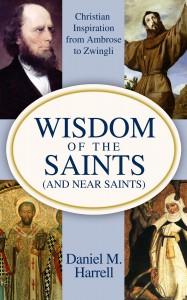 Just in time for summer! My full survey of Church Fathers A-Z is now available as an ebook from Amazon.
Just in time for summer! My full survey of Church Fathers A-Z is now available as an ebook from Amazon.
For over 20 years I have preached an annual sermon series on the “Church Fathers,” those personalities who over the early centuries of church history fashioned our faith and codified that which we have come to embrace as orthodox Christianity. As there have been numerous noteworthy Church Fathers (and Mothers) it seemed sensible to tackle them a letter at a time. It actually began as a one time event (Church Fathers Starting with the Letter A, inspired by a journal article I read), but then by popular demand turned into this annual series with the selections dependent to some extent on who was available under each letter that I considered interesting enough to my congregation. Letter H ended up being a more experiential summer with expert guests contributing—including portions of Handel being sung—and the choices under Letter I the following the summer were the result of an online contest (Ignatius of Loyola won out over Innocent III and Isidore of Pelusium. Go figure.) Each letter also depended on the number of Sundays available to do the series that summer. Point being: there is little here by way of consistency (You can only be so consistent over the course of 20 years, though I did break the record for the longest consistent sermon series!). Instead, I’ve sought a wide range of inclusion trusting that it would provide a selective sample of important church personalities.
My rationale for taking an annual peek at these people comes from my own conviction that our faith derives in no small part from the faithful personalities who’ve lived it and wrestled with it through crucial moments in church history. While we Protestants may not venerate these important people as saints, we cannot separate their contributions from our own doctrines and practice. We may hold to sola Scriptura (the Bible alone as source of authority), but interpreting and obeying the Bible necessarily stands on the interpretive and obedient shoulders of past believers and thinkers. Tradition is the memory of the church. And as Augustine argued, we are who we are only through our memories.











